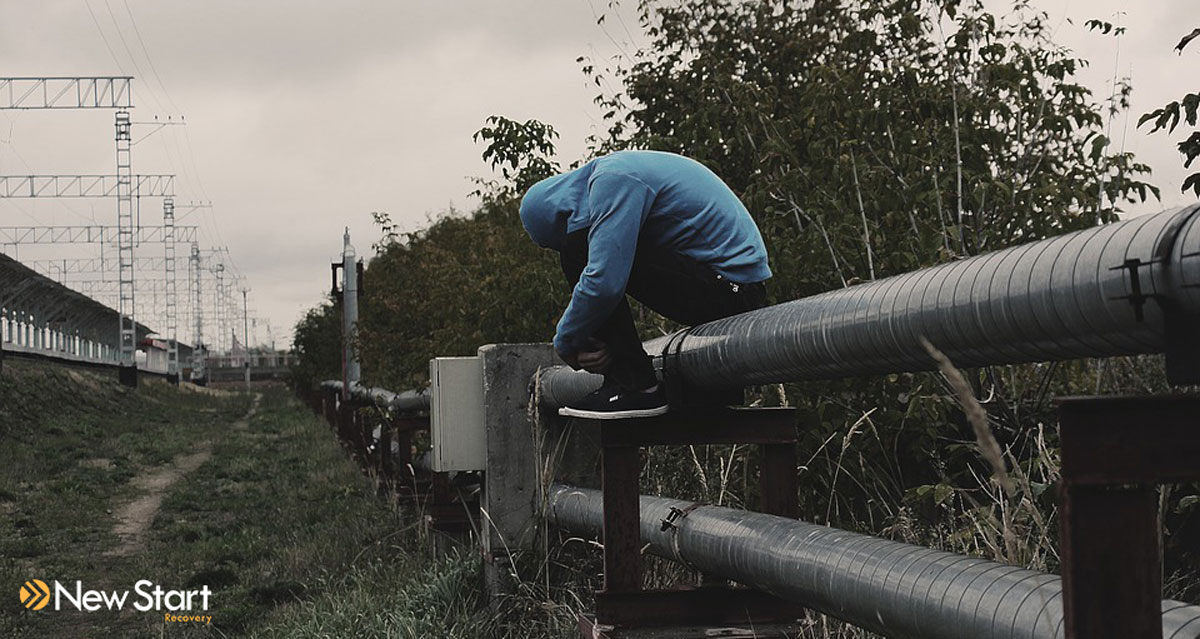A teenage kid is struggling with bullying, fitting in, and feelings of depression. He scavenges his parents’ medicine cabinet to help ease his pain. He also listens to his favorite band at max volume when he feels the world caving in. It helps him feel anchored and lifted at the same time. A few years later, he’s sober and happy and has allowed himself to be who he really is. He wakes up one morning and discovers that the frontman of his favorite band has killed himself. He doesn’t understand. The loss hits home. He doesn’t know what to do and only feels pain and sadness for the man who helped save him but couldn’t save himself any longer.

Everyone experiences loss at some point in their life. And it’s difficult for everyone. But dealing with loss and grief in recovery – especially early recovery – can seem almost impossible. Recovery teaches you to be strong and keep moving forward. But loss is one of those things that no one can really prepare for. And it can shake even the strongest person’s recovery. So it’s important that we understand our grief and learn ways to cope so it doesn’t take over.
Understanding Loss and Grief
The most important thing to understand about grief is that it’s personal. No one experiences grief the same way as someone else. Each individual’s personality, upbringing, experiences, and culture all affect how they deal with loss. There is also no timetable when it comes to grief. No one can tell you how you should grieve or for how long you should grieve. Some people grieve for days and some grieve for years.
The 5 Stages of Grief
Grief has typically been described in five stages in the past. But that doesn’t mean there is anything typical about grief. These stages are meant to just explain the process that someone might go through. But, again, grief is completely personal and dependent on the individual.
Denial – “No, this can’t be happening.”
Anger – “How did this happen? Who/what did this?”
Bargaining – “I would give up anything just to make this all go away.”
Depression – “I can’t handle this. I don’t feel like doing anything.”
Acceptance – “It happened and I can’t change it.”
While these stages make grief a little easier to understand, they’re not rules. In fact, many psychologists no longer even define grief by these stages. Grief can’t exactly be packaged so nicely. And everyone goes through it differently. Some people might not experience much anger but will be stuck with feelings of depression for what seems like an endless amount of time. Some people reach acceptance faster than others. And some people stay in denial for years. However a person goes through grief is okay. No one can tell a person when they need to move on or in what order they should experience these feelings.
Loss in Recovery
Recovery does help a person become healthier and live a better life but that doesn’t make people in recovery immune to things like pain, illness, or death. In fact, a lot of recovered addicts carry chronic illnesses with them that are more or less caused by their addictions. Even if those illnesses don’t lead to death, they can still hinder a person from experiencing certain joys in life, which is also a type of loss. And sometimes life just throws us a huge, heartbreaking curveball, taking our friends and loved ones from us. Loss is part of our lives as human beings.
Recovery doesn’t shield people from loss but it does make it different. Remember how we established that a person’s experiences affect the way they deal with loss and grief? Recovery is one of those experiences. The tools someone learns in recovery – even if they’re unrelated to loss – can help someone when grief sets in. But the struggles they went through in addiction as well as the struggles they may be going through in recovery will also affect the way a recovering addict handles loss.
Loss, grief, and depression can cause a person to relapse. All of these things can trigger feelings of hopelessness and make us question ourselves. Drugs and alcohol can seem like easy crutches to help relief that turmoil. However, the relief will only be temporary and those substances will actually make the problem worse. So it’s incredibly important that we learn ways to cope with loss and grief so that our sobriety doesn’t suffer.
Tips that Might Help:
-
Talk to Someone
When we grieve, we often try to do it alone. We’ll isolate ourselves or tell other people we’re okay. And maybe we are okay and totally capable of handling the loss – whatever it may be – on our own. But it also helps to talk to someone, be it a friend, parent, significant other, or therapist. And you don’t have to explicitly talk about your loss. Sharing stories and talking about your day can indirectly help you navigate through your grief.
-
Don’t Stay Isolated
Wanting to be alone is perfectly normal and okay when you’re grieving. Some of us like to – and may even feel like we need to – take time to ourselves to process the loss. Again, no one can really tell you when to “rejoin” the rest of the world. But it’s important that we don’t keep ourselves isolated for too long. “Too long” is a relative term depending on the person and the situation, but eventually human companionship will help more than isolation will.
-
Change the Narrative
You can’t undo what has already been done. A loss can’t really be given back after it happens, especially if the loss involves a death. But you can change the way the loss reads. It can really help to change your mindset from victim to hero, more or less. For example, the man who grieves the loss of the lead singer of his favorite band and the person who inspired him to pull himself up and keep going has every right to mourn that loss. But it might help him to pick up where that singer left off and inspire himself (and potentially others) to stay strong and happy. I understand that this is easier said than done, but it’s definitely worth trying.
 Loss doesn’t just have to mean death. Loss can also be…
Loss doesn’t just have to mean death. Loss can also be…
- Death of a loved one
- A missed opportunity
- Death of a dream
- Being fired or let go from a job
- Losing your home
We recently lost Chester Bennington, the lead singer and frontman of alternative rock band Linkin Park, after he committed suicide on July 20th. This loss hit a lot of people very deeply. Chester’s death also hit home for many people in recovery, as he himself struggled with substance abuse as well as mental illness. Losing Chester is heartbreaking to accept. But we can shift this narrative too, just like our proposed, fictional teenager/man. Linkin Park’s music helped many people grow up, get through hard times, and even find their calling. Chester’s death doesn’t negate that. And he can continue to be an inspiration to us if we continue his legacy. He was kind, loving, and open about his struggles. We need to be these things too. And until we all, as a society, start talking about depression, mental illness, suicide, grief, and addiction openly, we will continue to lose people – especially those suffering from dual diagnosis – to those very things.
If you or someone you know is struggling, New Start can help. We understand the relation between grief and substance abuse as well as loss and addiction. If you need help, we’re here. You can call us at 855-737-7363 or reach out to us on our live chat.

